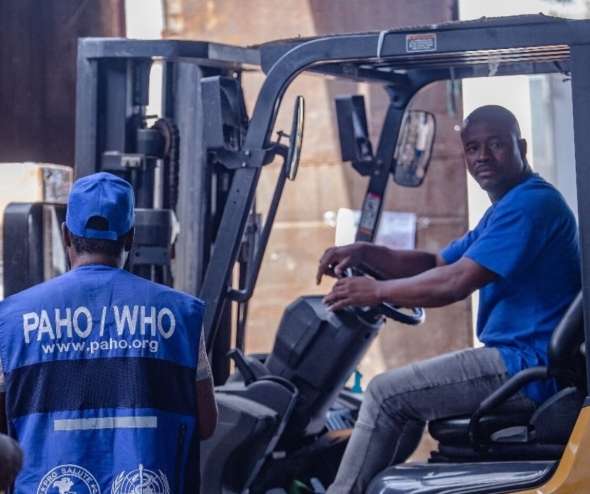PAHO Intervention Addresses Critical Healthcare Crisis in Haiti.
The escalating violence in Haiti has precipitated a dire humanitarian crisis, severely compromising the nation’s already fragile healthcare system. Armed groups, operating with impunity, are targeting healthcare facilities, disrupting essential services and denying vulnerable populations access to life-saving medical care. This assault on healthcare infrastructure has forced over 700,000 people to flee their homes, creating a large displaced population further straining resources and increasing the risk of disease outbreaks. The attack on Bernard Mevs Hospital in Port-au-Prince, a critical healthcare provider, exemplifies the gravity of the situation and underscores the urgent need for international intervention to protect healthcare workers, facilities, and patients. The violence has not only disrupted routine medical care but has also severely hampered the response to other health emergencies, including the ongoing cholera outbreak. This confluence of crises poses an existential threat to the Haitian population and demands immediate action from the international community.
The Pan American Health Organization (PAHO) has issued an urgent plea for the protection of healthcare services and facilities in Haiti, emphasizing the sanctity of medical neutrality in conflict zones. International humanitarian law mandates the protection of healthcare workers and facilities during armed conflict, yet the persistent attacks in Haiti demonstrate a blatant disregard for these principles. The targeting of hospitals and medical personnel not only deprives individuals of essential medical care but also undermines the entire healthcare system, hindering its ability to respond to both routine and emergency health needs. The forced displacement of hundreds of thousands of Haitians adds another layer of complexity to the crisis, increasing the demand for healthcare services while simultaneously limiting access. The situation demands immediate action to ensure the safety and security of healthcare workers and the continuity of essential medical services.
The consequences of the escalating violence extend beyond immediate physical harm, creating ripple effects that exacerbate the vulnerability of the Haitian population. The disruption of healthcare services has left many without access to basic medical care, increasing morbidity and mortality rates. The displacement of large populations has led to overcrowding in shelters and informal settlements, creating ideal conditions for the spread of infectious diseases, including cholera. The attack on Bernard Mevs Hospital, a key provider of healthcare services, has further diminished the capacity of the healthcare system to respond to the growing needs of the population. The cumulative impact of these factors is a humanitarian catastrophe that demands urgent and sustained international attention.
PAHO, in collaboration with the Haitian Ministry of Public Health and Population (MSPP) and other international partners, has been working tirelessly to provide essential medical assistance to the affected population. Despite the challenging security environment, PAHO has delivered over 38 tons of medical supplies and facilitated mobile clinics, providing over 9,000 consultations in displacement sites. These efforts are aimed at mitigating the impact of the violence on healthcare access and addressing the urgent medical needs of the displaced population. PAHO’s support also extends to water, sanitation, and hygiene (WASH) initiatives to combat the spread of cholera and other waterborne diseases. These interventions are critical to preventing further deterioration of the public health situation and saving lives.
Recognizing the overwhelmed state of Haiti’s healthcare system, PAHO has provided critical support to Hôpital Universitaire La Paix, the only public hospital still managing mass casualties. This support includes the provision of essential medical supplies and resources to ensure the hospital’s continued operation and ability to provide free or low-cost services to over 21,000 patients in 2024. This assistance is crucial for maintaining access to emergency medical care, particularly for vulnerable populations such as pregnant women and displaced individuals. PAHO’s ongoing commitment to strengthening Haiti’s healthcare infrastructure is a testament to its dedication to serving the most vulnerable in times of crisis.
PAHO’s multifaceted approach to addressing the healthcare crisis in Haiti involves not only the delivery of essential medical supplies and equipment but also the training of healthcare workers and the strengthening of local healthcare systems. This comprehensive strategy aims to build long-term capacity within the Haitian healthcare system, enabling it to respond effectively to both immediate and future health challenges. The organization’s work focuses on the areas most affected by the crisis, ensuring that aid reaches those who need it most. PAHO’s efforts are supported by a coalition of international partners, including the United Nations Central Emergency Response Fund (CERF), the German Ministry of Foreign Affairs, the European Union, and USAID, demonstrating a global commitment to alleviating the suffering of the Haitian people. This collaborative approach is essential for addressing the complex and multifaceted nature of the crisis and ensuring a sustained and effective response.
Share this content:












Post Comment